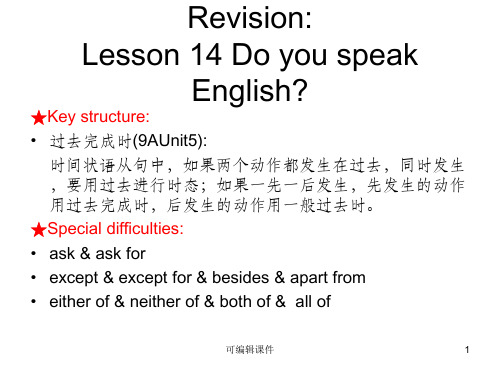新概念英语第二册第十五课课件Lesson15_good_news
新概念英语第二册lesson15.ppt

Language points:
1. afford sth. / $ 买得起,付得起(…钱)
e.g. I can’t afford the house because it is too expensive. 你买得起这种最新款的手机吗?
afford the time 花得起时间 afford to do sth. 有足够的金钱去做…
【Key structures】
间接引语
把某人所说的话告诉另外一个人时,应该使用间接引语。 间接陈述句的时态往往受引述动词的影响。
最新新概念第二册第十五课(公开课课件)

He didn't look up from his
desk when I entered.
look up
look up
查找
-What’s the meaning of “discovery”? -Look it up in your dictionary.
I have a hundred pounds now.
Comprehension check 1 The writer felt nervous because__________ • Mr. Harmsworth wanted to see him • the secretary told him that Mr. Harmsworth wanted to see him • business was very bad • he thought he would lose his job 2 The writer_________ • expected to receive some extra money • was surprised to receive some extra money • wanted to receive some extra money • asked for some extra money
New Word
Chapter3:
Grammar
Chapter4: Exercise
• Key words and expressions
New words and expressions
secretary [‘sekrətəri] n. 秘书
New words and expressions
an object clause
done新概念第二册Lesson_15_Good_news(1)

Practice: 用so, such 填空 • 1.He is such _____a good student that we all like him. so • 2.He is ______good a student that we all like him. such • 3.It was ______bad weather that he had to stay at home. so • 4.I've had ______many falls than I'm black and blue all over. • 5.The story is so ___ amusing that everyone is amused.
直接引语和间接引语 Direct Speech and Indirect Speech
• • • •
直接引述别人的话,叫“直接引语”; 用自己的话转述别人的话叫“间接引语”; 直接引语一般前后要加引号; 间接引语不用引号。
如: John said, ―I like reading very much.‖ John said that he liked reading very much.
• •
Key words:
• afford v. 做得到;给予;提供 • e.g.: His three grandchildren afforded him greatest pleasure in his old age. • 他的三个孙子给他的晚年增添了极大的快乐。 • e.g.: The house is so expensive that I can't afford it. • 房子太贵了,我买不起。
新概念第二册第15课完整ppt课件

可编辑课件
4
secretary n.秘书 (英)大臣,(美)部长
☆secret n.秘密
tell a secret keep a secret
the secret of success an open secret
☆secret adj.秘密的,保密的,不公开的
a secret marriage a secret document
• 跳舞给我们带来快乐。
可编辑课件
8
afford
翻译句子
1) 他买得起轿车。 He can afford (to buy) a car.
2) Thanks to buy the success of the business, we can afford a cottage.
多亏了生意兴隆,我们今年能够买一幢别墅。
A./; /
B.a; /
C./; a
D.a; a
2.He___in the factory for three years before he joined the Army.
A.works B.had worked C.will work D.has worked
3.I like___of the books, that is, I don't like___of the designs.
2) 他们停止了工作,以便吃午饭。
He interrupted his work to eat his lunch.
3) 你打断了我的思路。
You interrupted my thoughts.
可编辑课件
14
Extra ['ekstrə]
adj. 额外的 • extra time 加时赛 • The football match went into extra time. • extra work 额外工作 • extra pay for extra work
新概念英语第二册第15课

新概念英语第⼆册第15课Lesson 15 Good NewsThe secretaryalready left. I knew that my turn had come.'Mr. Harmsworth,' I said in a weak voice.'Don't interrupt,' he said.New words and expressions ⽣词和短语1.secretary ['sekr?t?ri] n. 秘书(secret['si:krit])私⼈秘书?2.nervous [?n?rv?s] adj. 精神紧张的;3.afford [??f?rd] v. 负担得起;4.weak [wik] adj. 弱的;5.interrupt [??nt??r?pt] v. 插话,打断参考译⽂:秘书告诉我说哈姆斯沃斯先⽣要见我。
我⾛进他的办公室,感到⾮常紧张。
我进去的时候,他连头也没抬。
待我坐下后,他说⽣意⾮常不景⽓。
他还告诉我,公司⽀付不起这么庞⼤的⼯资开⽀,有20个⼈已经离去。
我知道这次该轮到我了。
“哈姆斯沃斯先⽣,”我⽆⼒地说。
“不要打断我的话,”他说。
然后他微笑了⼀下告诉我说,我每年将得到1,000 英镑的额外收⼊。
1.The secretary told me that Mr. Harmsworth would see me.2.I felt very nervous when I went into his office.3.He did not look up from his desk when I entered.4.After I had sat down, he said that business was very bad.5.He told me that the firm could not afford to pay such large salaries.6.Twenty people had already left.7.I knew that my turn had come.8.'Mr. Harmsworth,' I said in a weak voice.9.'Don't interrupt,' he said.10.T hen he smiled and told me I would receive an extra thousand pounds a year!参考译⽂1.秘书告诉我说哈姆斯沃斯先⽣要见我。
新概念英语第二册Lesson15-good-sPPT课件一等奖新名师优质课获奖比赛公开课

④After I had sat dito/dwonin, gh+etasakieds/tthooakt bsbustiimneestsowdaoss( cost)+money
⑤He told me thatStbh+epafiyr(mpacido)umldonoeyt afford to pay such
n. 秘书 adj. 焦急旳 vt. 提供; 予以 adj. 虚弱旳 vt.& vi. 打断 adj. 额外旳
New words and expressions
secretary ['sekrətrɪ] nervous ['nə:vəs] afford [ə'fɔ:d] weak [wi:k] interrupt [ɪntə'rʌpt] extra ['ekstrə]
8.When I _a_r_r_iv_e_d______(arrive) at the station, he _h_a_d_l_e_f_t ___(leave).
Lesson 15 Good news ★New words and expressions:
secretary ['sekrətrɪ] nervous ['nə:vəs] afford [ə'fɔ:d] weak [wi:k] interrupt [ɪntə'rʌpt] extra ['ekstrə]
Happy moment
How many cookies could a good cook cook if a good cook could cook cookies? A good cook could cook as much cookies as a good cook who could cook cookies.
新概念英语第二册Lesson15 Good news.

Can we afford to go abroad ?
2. 抽得出(或匀得出)时间,花费得起(时间):
e.g: We can't afford the loss of a day.
我们浪费不起一天时间。
T: 我抽不出时间。
I can't afford the time.
playing basketball?”
playing basketball.
他问我:“你喜欢打篮球吗? 他问我,我是否喜欢打篮球。 ”
Grammer - 2 直接引语转换间接引语 -不同句式的转变规则
2.3 特殊疑问句
直接引语 (变化前)
间接引语(变化后)
特殊疑问句 wh-词引导的宾语从句
My sister asked me , My sister asked me what I
间接引语(变化后)
带 to 的不定式 He asked us to be seated.
他对我们说:“请坐。”他请我们坐下。
Grammer - 2 直接引语转换间接引语
2.5 转换中的要点1-人称的转换
• 1 直接引语中的第一人称,一般转换为第三人称,如: He said,“I am very sorry.” ——>He said that he was very sorry.
nervous
to be able to buy or pay faofrford
useless,not strong
weak
a person whose work is supporting manage
secretary
Fast Reading
4 minutes
新概念第二册第15课完整ppt课件

2024/1/28
15
关键语法结构剖析
01
现在完成时的用法及构成
现在完成时是表示过去发生的动作对现在造成的影响或结果,其构成是
“have/has + 过去分词”。
02
动词不定式的用法
动词不定式是一种非谓语动词形式,可以作主语、宾语、表语、定语、
状语等,其构成是“to + 动词原形”。
2024/1/28
重点
难点
理解课文中的文化内涵和背景知识; 提高学生的阅读、听力、口语和写作 能力。
掌握课文中出现的重点词汇和短语; 学习课文中出现的语法结构和表达方 式。
2024/1/28
5
学习方法与建议
预习
提前预习课文,了解课 文大意和背景知识。
2024/1/28
听讲
认真听讲,注意老师的 讲解和重点提示。
练习
复习
流利度。
2024/1/28
24
角色扮演活动设计
分配角色
根据主题分配角色,如导游、 游客、售货员、顾客等。
角色扮演
按照设计好的情节进行角色扮 演,注意语音语调和肢体语言 。
确定主题
选择与生活、工作相关的主题 ,如商务会议、旅游、购物等 。
2024/1/28
设计情节
为每个角色设计相应的情节和 对话,确保情节合理且有趣。
18
05 听力训练及技巧 指导
2024/1/28
19
听力材料选取原则
2024/1/28
真实性
01Leabharlann 选择真实场景下的对话或独白,如新闻、讲座、电影等,以提
高学生对实际语言运用的理解和反应能力。
多样性
02
涵盖不同领域和话题,包括日常生活、学术、商务等,帮助学
- 1、下载文档前请自行甄别文档内容的完整性,平台不提供额外的编辑、内容补充、找答案等附加服务。
- 2、"仅部分预览"的文档,不可在线预览部分如存在完整性等问题,可反馈申请退款(可完整预览的文档不适用该条件!)。
- 3、如文档侵犯您的权益,请联系客服反馈,我们会尽快为您处理(人工客服工作时间:9:00-18:30)。
He is nervous.
• nervous ['nə:vəs] adj. 精神紧张 的 神经
• nerve [nə:v] n. 神经 • 短语:
• be nervous about • 对…. 感到紧张
• Eg: Are you nervous about the English exam?
直接引语(变化前) 现在进行时
间接引语(变化后) 过去进行时
“I’m making coffee for you all,” she She said she was making coffee
said.
for us all.
Grammer - 2 直接引语转换间接引语
2.6 转换中的要点总结2-时态的转换3
Grammer - 2 直接引语转换间接引语
转换中的要点总结2-时态的转换1
直接引语(变化前) 一般现在时
间接引语(变化后) 一般过去时
“I know it,” he said.
He said that he knew it.
Grammer - 2 直接引语转换间接引语
2.6 转换中的要点总结2-时态的转换2
He said, “I have been doing it for hours.”
He said he had been doing it for hours.
Grammer - 2 直接引语转换间接引语
2.6 转换中的要点总结2-时态的转换7
直接引语(变化前) 过去完成时
间接引语(变化后) 过去完成时
Eg:He interrupted me while I was speaking. Eg:You interrupted my thoughts.
Look up
a) 抬头
我抬起头来看时,见到有学生静静地看着我。
When I looked up, I saw five students watching me quietly.
Grammer - 直接引语转换间பைடு நூலகம்引语
转换中的要点1-人称的转换
▪ 1直接引语中的第二人称,如果原话是针对第三人称说的,转换成第三人称。 如:
She said to her son, “I'll check your homework tonight.” ——> She said to her son that she would check his homework that night.
Lead-In
• 1. Have you ever felt nervous? What makes you nervous? • 2. What would you do with an extra 1000 yuan a year? • 3. Try go imagine, if you are required to see your boss or your head teacher
• 10、Then he smiled and told me (that)I would receive an extra thousand pounds a year! 间接引语。
• =He said, ‘You will receive an extra thousand pounds a year.’ 直接引语。 • an extra (sum of) thousand pounds 省略。 • a sum of... 一笔… • 例句:I need a large sum of money.
b) 查阅,查找
你应该在字典上查一下这个单词。
You should look the word up in the dictionary.
• Extra [adj]额外的 • The football match went into extra time .
听音频回答问题
• 1. What did the secretary tell the writer? • That Mr. Harmsworth would see the writer. • 2. Where did the writer go? • To his office. • 3. How did the the writer feel when he went in? • Very nervous. • 4. What did Mr.Harmsworth say about the business? • That is was very bad. • 5. How many people had already left? • Twenty.
immediately, how do you feel about that?
Lesson 15 Good News
• secretary ['sekrətəri] n. 秘书 • Secret ['si:krit] n. n. 秘密 • 短语 • Tell a secret 说出一个秘密 • Keep a secret 保守秘密
• afford [ə'fɔ:d] v. 负担得起 • afford sth. • Eg:I can afford the car.我买得起这辆车
• weak [wi:k] adj. 弱的 • in a weak voice . adv. • 声音很弱地
• Eg: The students answer • the teacher in a week • Voice.
weak弱的 Strong强的
stop or make a break
• interrupt [,intə'rʌpt] v. 插话,打断 • Interruption [,intə'rʌpʃən] n. 中断;干扰;中断之事 • Eg: It is impolite to interrupt others .
• 9、'Don't interrupt,' he said. 直接引语。 • =He told me not to interrupt him. 直接引语。 • interrupt sb. / sth.打扰某人/打扰某事 • 例句: Don’t interrupt me! • 例句: He interrupted the meeting by accident. • 例句: I’m sorry to disturb you.
• 4、After I had sat down, he said (that) business was very bad. 过去完成时。间接引 语。
• =He said, ‘Business is very bad.’ 直接引语。
• 5、He told me (that) the firm could not afford to pay such large salaries. 间接引语。 • =He said, ‘The firm can not afford to pay such large salaries.’ 直接引语。 • afford 负担 → • Afford to do sth. 负担得起 • 例句:We cannot afford this car. She can’t afford to send his son to college.
直接引语(变化前) 过去进行时
间接引语(变化后) 过去完成进行时
“I was waiting for Jim,” she said.
She said she had been waiting for Jim.
Grammer - 2 直接引语转换间接引语
2.6 转换中的要点总结2-时态的转换5
直接引语(变化前) 现在完成时
课文精讲
• 1、The secretary told me (that) Mr. Harmsworth would see me. 间接引语 • =The secretary said, ‘Mr. Harmsworth will see you.’ 直接引语。 • Eg: The man said to me that I was a bastard. • --The man said, ‘ You are a bastard’.
2.7 转换中的要点总结3-特例说明1
由直接引语转变为间接引语,下列情况下从句的时态不变:
1. 不变的真理 The teacher said to the students, “Water freezes when the temperature falls below 0℃.” → The teacher told the students that water freezes when the temperature falls below 0℃.
▪ 2 人称的转换包括人称代词、物主代词和名词性物主代词等。如:
He asked me, “Will you go to the station with me to meet a friend of mine this afternoon?” ——>
He asked me whether I would go to the station with him to meet a friend of his that afternoon. 总之,人称的转换不是固定的,具体情况,具体对待,要符合逻辑。
• 8、'Mr. Harmsworth,' I said in a weak voice. 直接引语。 • in a.......voice 用一种…的声音。 • 例句:She shouted in a sharp voice. • She speak in a strong voice. • She speaks in a loud voice.
